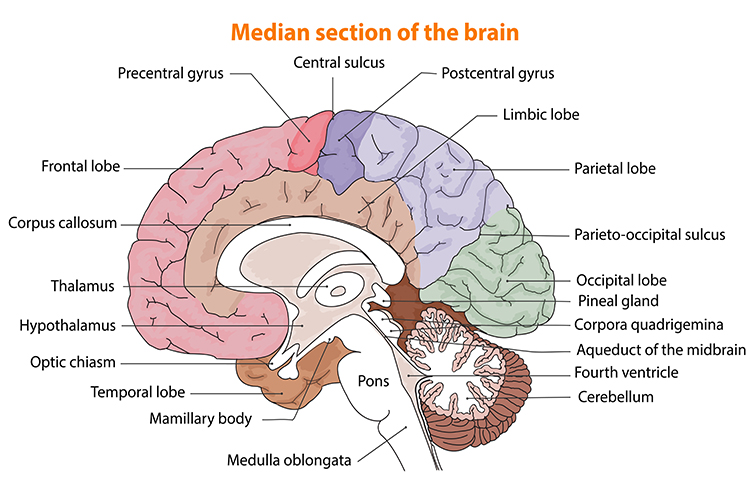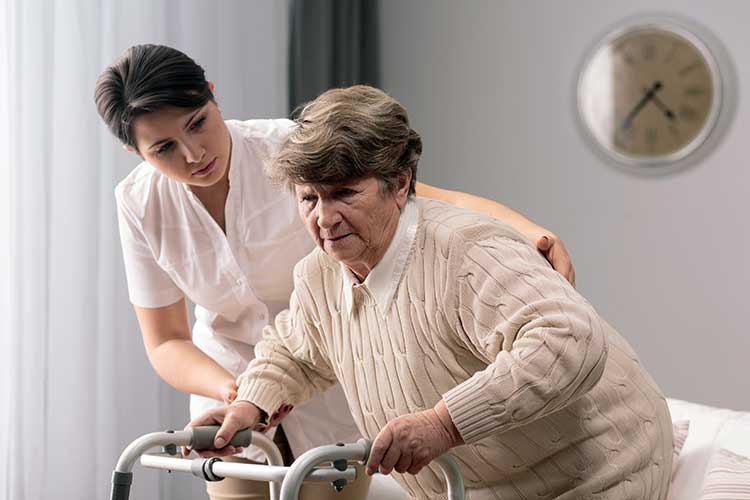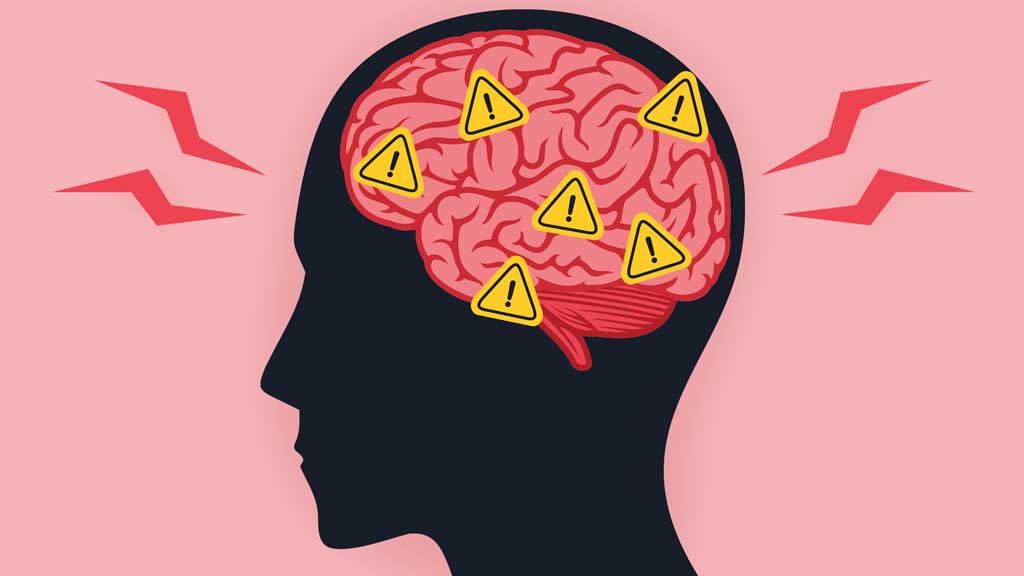The average human brain weighs about 1.3 to 1.4 kg and accounts for approximately 2% of our overall body weight (Cherry 2022).
Our brain is who we are. It is the one thing that makes us unique.
When damage occurs to the brain, changes consequently occur to the person. These changes vary considerably and may include alterations to the person’s speech, mobility, memory and even personality (Synapse 2021).
Brain injuries can be acquired in a variety of ways, including:
- Stroke
- Tumour
- Traumatic injury
- Alcohol or drug use
- Poisoning
- Infection
- Disease
- Assault or violence
- Hypoxia/anoxia (lack of oxygen)
- Degenerative conditions such as Parkinson’s disease
- Fetal alcohol spectrum disorder (FASD).
(Synapse 2021)
The symptoms displayed as a result of brain injury are dependent on where the brain was damaged and the extent of the damage (Synapse 2021).
This article will outline the effects of damage to different areas of the brain.

Frontal Lobe
The frontal lobe is considered the ‘control panel’ of our personality and communication (Healthline 2021).
The frontal lobe is involved in concentration, memory, judgment, problem-solving, emotional expression and motor function, including motor control of speech. It is also important to note that this is where Broca’s area for language production is located (Healthline 2021).
Damage to the frontal lobe can result in:
- Inability to express language (Broca’s aphasia)
- Motor weakness
- Personality and behavioural changes
- Inability to plan a sequence of complex movements to complete a task with several steps (e.g. making coffee)
- Difficulty focusing on a task
- Difficulty problem-solving
- Difficulty interacting with others
- Mood changes.
(Queensland Health 2022a)
Parietal Lobe
The parietal lobe assists in the coordination, processing and interpretation of sensory information, in addition to the construction of a spatial coordinate system (Queensland Health 2022b).
Damage to the parietal lobe can result in:
- Difficulty locating words when writing
- Difficulty reading
- Difficulty drawing objects
- Difficulty with differentiating between left and right
- Difficulty with mathematics
- Loss of spatial awareness and awareness of certain body parts
- Difficulties with hand and eye coordination
- Visual field deficits.
(Queensland Health 2022b)
Occipital Lobe
The occipital lobe is primarily responsible for visual processing and perception and receives visual data from the retina. It is the smallest lobe in the brain (SpinalCord.com 2020a).
Damage to the occipital lobe can result in:
- Visual field deficits
- Difficulty with locating objects in the visual field
- Visual hallucinations
- Word blindness (the inability to recognise words)
- Difficulties with reading, writing, recognising objects and distinguishing colours.
(Queensland Health 2022c)
Temporal Lobe
The temporal lobe processes auditory information, encodes memories and is an interpretive area for the integration of visual, auditory and somatic information (Queensland Health 2022d).
It also contains Wernicke’s area, which facilitates the understanding and processing of speech and language (Spinalcord.com 2020b).
Damage to the temporal lobe can result in:
- Difficulty recognising faces (prosopagnosia)
- Difficult in understanding spoken words (Wernicke’s aphasia)
- Impaired memory
- Personality changes
- Difficulty with identifying and categorising seen objects
- Temporal lobe epilepsy.
(Queensland Health 2022d; Spinalcord.com 2020b)

Thalamus and Hypothalamus
The thalamus receives sensory information from all of the sensory systems (except smell) and passes it on to the relevant primary cortical area. Additionally, it helps regulate levels of alertness and consciousness. Damage to the thalamus can result in a permanent coma (Boundless.com 2022).
The hypothalamus has many functions, including:
- Linking the nervous system to the endocrine system
- Temperature regulation
- Controlling appetite
- Releasing hormones
- Maintaining daily physiological cycles
- Regulating fluid balance
- Regulating blood pressure
- Regulating the autonomic nervous system
- Managing sexual behaviour
- Regulating emotional responses.
(Boundless.com 2022; Seladi-Schulman 2022)
Dysfunction of the hypothalamus can result in:
- Diabetes insipidus
- Prader-Willi syndrome (hypothalamus fails to recognise when someone is full after eating)
- Hypopituitarism.
(Seladi-Schulman 2022)
Brain Stem
The pons, midbrain and medulla oblongata make up the brain stem, which controls essential life functions such as respiration, heart rate, blood pressure and sleeping (Basinger & Hogg 2022).
The brain stem is also associated with other functions such as:
- Alertness
- Attention
- Arousal
- Conveying information and signals between the peripheral nerves and spinal cord to the upper brain
- Other autonomic functions (e.g. digestion, salivation, perspiration, pupil dilation and contraction, urination).
(Physiopedia 2021)
The Pons
The pons bridges different parts of the nervous system together and regulates respiration. Many important nerves originate in the pons (Healthline 2018).
Damage to the pons can result in:
- Locked-in syndrome
- Coma
- Sleep disturbances
- Sensory dysfunction
- Arousal dysfunction.
(Bailey 2023)
Midbrain
The midbrain is associated with auditory and visual processing and motor movements, particularly of the eyes (Encyclopedia Britannica 2020).
Damage to the midbrain can result in:
- Vision problems
- Hearing problems
- Movement disorders
- Memory problems.
(GoodTherapy 2015)
Medulla Oblongata
The medulla oblongata connects the brain to the spinal cord, with most sensory and motor fibres either crossing into the brain or finishing at this level (Yetman 2021).
Damage to the medulla oblongata can result in:
- Breathing difficulties
- Difficulty swallowing
- Loss of gag, sneeze and cough reflexes
- Vomiting
- Balance problems
- Loss of sensation
- Tongue dysfunction
- Loss of muscle control.
(Yetman 2021)
Cerebellum

The cerebellum is responsible for the coordination of movement and controls balance, posture, and muscle tone (Queensland Health 2022e).
Damage to the cerebellum can result in:
- Inability to walk
- Tremors
- Impaired coordination
- Inability to reach out and grab objects
- Dizziness and vertigo
- Slurred speech
- Inability to make rapid movements.
(Queensland Health 2022e)
Every individual’s brain is different, meaning damage to one area of the brain will show certain symptoms in one person but may affect someone else in a different way.
It’s also important to note that for some brain injuries, secondary injuries will also occur as well as a result of the swelling and homeostatic response to the initial injury (Synapse 2021).
Caring for someone following a brain injury will be dependent on the injury and subsequent deficits, and often involves rehabilitation from a multidisciplinary team.
Test Your Knowledge
Question 1 of 3
Which lobe of the brain contains Broca’s area?
Topics
References
- Bailey, R 2023, ‘Where in the Brain Is the Pons’, ThoughtCo, 5 April, viewed 13 June 2023, https://www.thoughtco.com/anatomy-of-the-brain-pons-373227
- Basinger, H & Hogg, JP 2022, ‘Neuroanatomy, Brainstem’, StatPearls, viewed 13 June 2023, https://www.ncbi.nlm.nih.gov/books/NBK544297/
- Boundless.com 2022, ‘The Diencephalon’, Boundless Anatomy and Physiology, viewed 13 June 2023, https://www.coursehero.com/study-guides/boundless-ap/the-diencephalon/
- Cherry, K 2022, ‘The Size of the Human Brain’, Verywell Mind, 17 May, viewed 13 June 2023, https://www.verywellmind.com/how-big-is-the-brain-2794888
- Encyclopedia Britannica 2020, Midbrain, Encyclopedia Britannica, viewed 13 June 2023, https://www.britannica.com/science/midbrain
- GoodTherapy 2015, Midbrain, GoodTherapy, viewed 13 June 2023, https://www.goodtherapy.org/blog/psychpedia/midbrain
- Healthline 2021, ‘Frontal Lobe’, Healthline, 30 November, viewed 13 June 2023, https://www.healthline.com/human-body-maps/frontal-lobe#1
- Healthline 2018, ‘Pons’, Healthline, 23 January, viewed 13 June 2023, https://www.healthline.com/human-body-maps/pons#1
- Physiopedia 2021, Brainstem, Physiopedia, viewed 13 June 2023, https://www.physio-pedia.com/Brainstem
- Queensland Health 2022e, Brain Map: Cerebellum, Queensland Government, viewed 13 June 2023, https://www.health.qld.gov.au/abios/asp/bcerebellum
- Queensland Health 2022a, Brain Map Frontal Lobes, Queensland Government, viewed 13 June 2023, https://www.health.qld.gov.au/abios/asp/bfrontal
- Queensland Health 2022c, Brain Map Occipital Lobes, Queensland Government, viewed 13 June 2023, https://www.health.qld.gov.au/abios/asp/boccipital
- Queensland Health 2022b, Brain Map Parietal Lobes, Queensland Government, viewed 13 June 2023, https://www.health.qld.gov.au/abios/asp/bparietal
- Queensland Health 2022d, Brain Map: Temporal Lobes, Queensland Government, viewed 13 June 2023, https://www.health.qld.gov.au/abios/asp/btemporal_lobes
- Seladi-Schulman, J 2022, ‘Hypothalamus Overview’, Healthline, 31 January, viewed 13 June 2023, https://www.healthline.com/human-body-maps/hypothalamus
- SpinalCord.com 2020a, Occipital Lobe: Function, Location and Structure, SpinalCord.com, viewed 13 June 2023, https://www.spinalcord.com/occipital-lobe
- SpinalCord.com 2020b, Temporal Lobe: Function, Location and Structure, SpinalCord.com, viewed 13 June 2023, https://www.spinalcord.com/temporal-lobe
- Synapse 2021, Acquired Brain Injury: The Facts, 6th edn, Synapse, viewed 13 June 2023, https://synapse.org.au/abi-the-facts/
- Yetman 2021, ‘What Does the Medulla Oblongata Do and Where’s It Located?’, Healthline, 22 December, viewed 13 June 2023, https://www.healthline.com/health/medulla-oblongata
 New
New 
